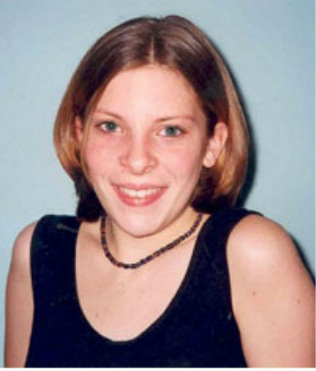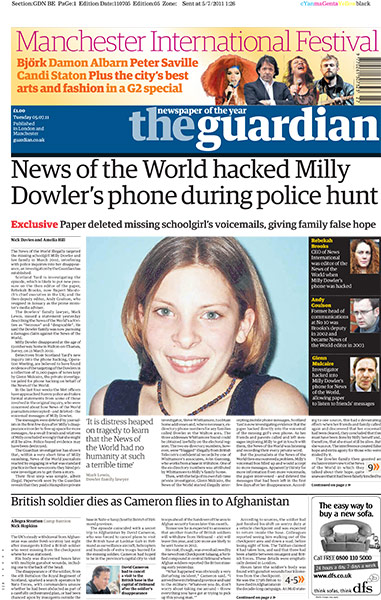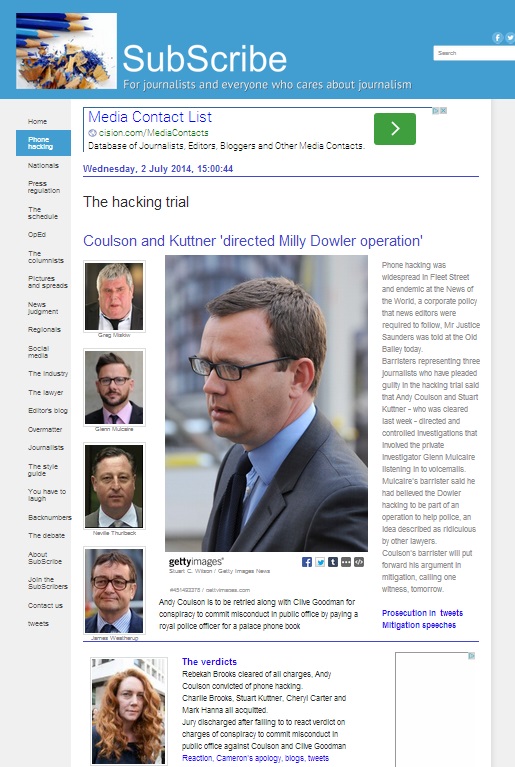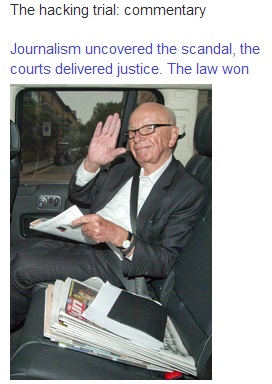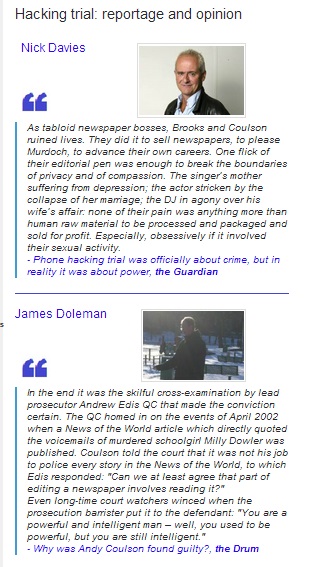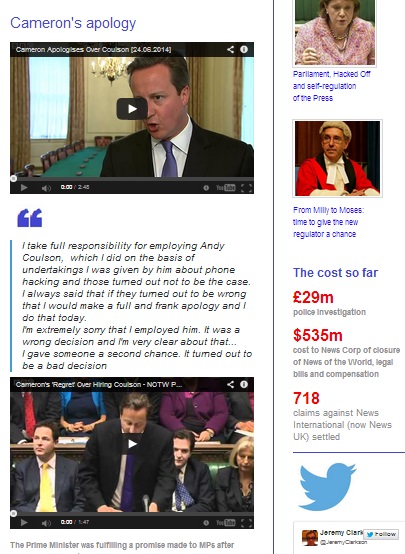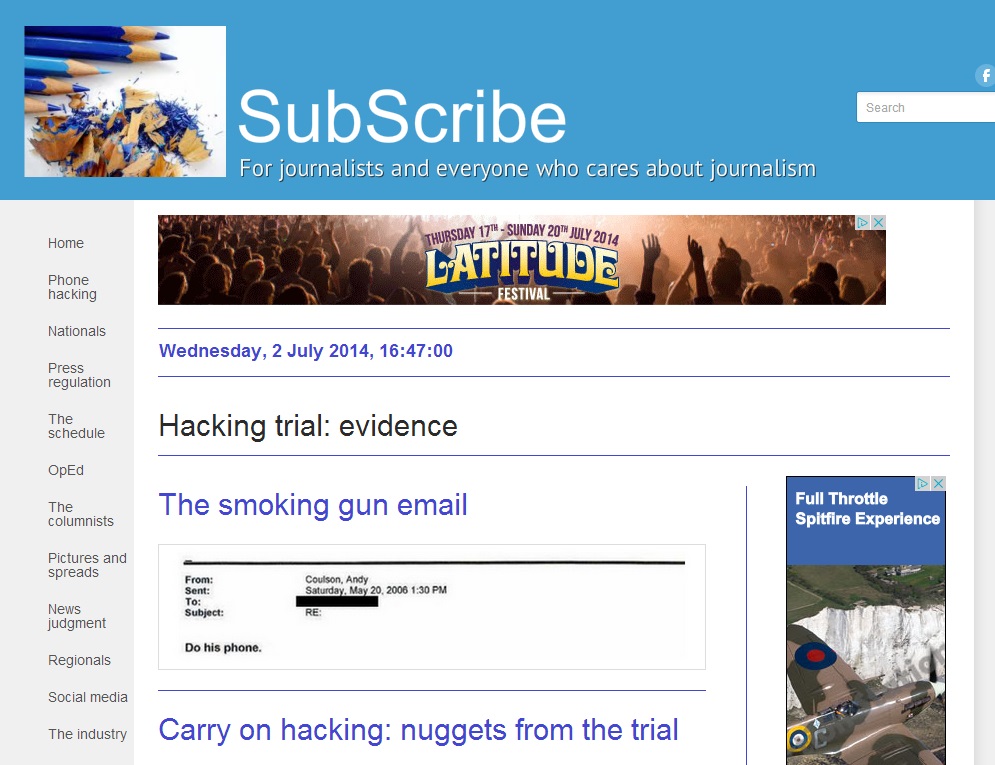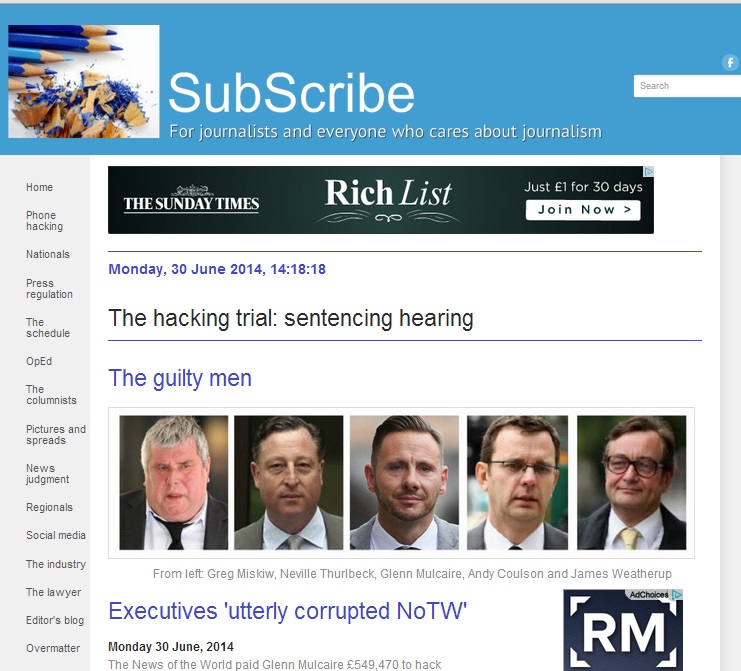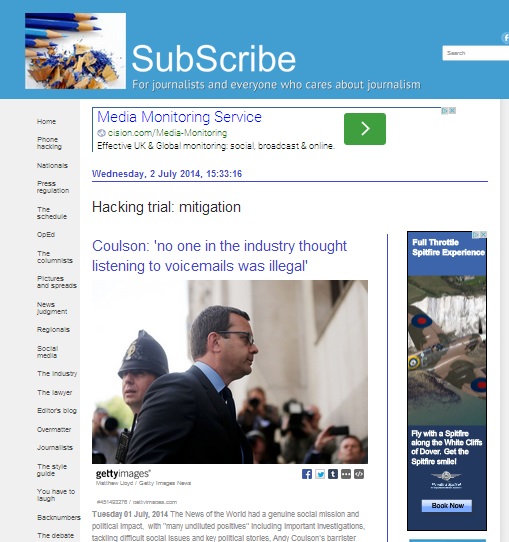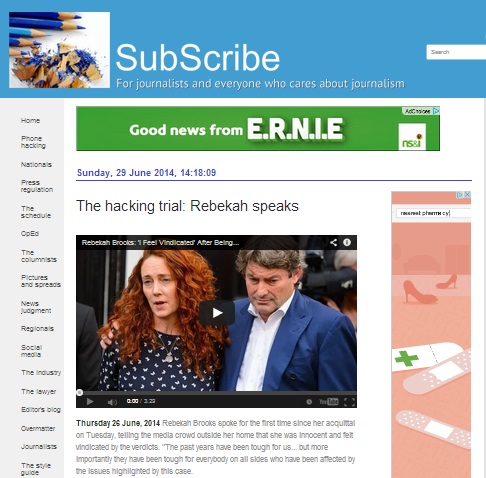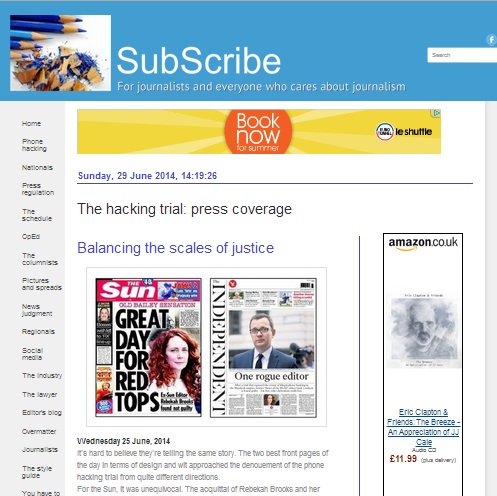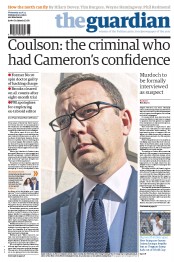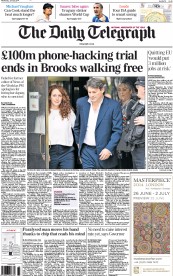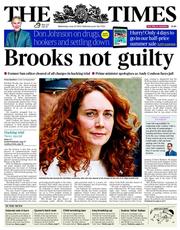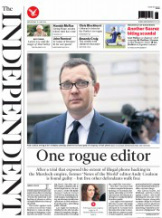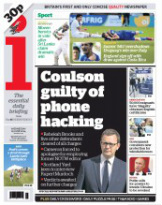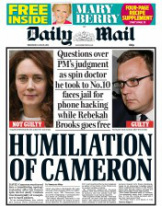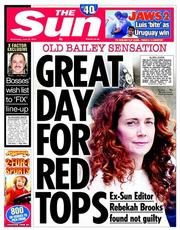The hacking trial: background
One rotten apple - or the whole orchard?On July 4 2013 Exaro released a tape of a meeting between Rupert Murdoch and some of his staff at the Sun, who were aggrieved at the way they had been treated by the police "for doing their jobs" and because they felt abandoned by their employer. The tape formed the central element of a Channel 4 Despatches documentary and revived interest in the whole phone hacking saga, which was moving into a new phase.
The following is the first part of a long blogpost written in the light of those developments. Some of it has already been published on this site, but with bits missing. With the ending of the Brooks-Coulson trial, it may offer some useful background - Liz Gerard Milly Dowler's phone has cost the taxpayer millions of pounds.
It has brought extended anguish to her parents. It has humiliated the Metropolitan Police. It has embarrassed the Prime Minister. It has given Rupert Murdoch the excuse he needed to close Britain's most popular newspaper. And it has led to the greatest threat to press freedom in this country for centuries. One teenager's mobile phone. That, you might well say, is the equivalent of blaming overstretched social workers and faults in the 'system' rather than callous, neglectful parents when a two-year-old is battered to death. And so it is. But it remains the case that every development in the examination of newspaper practices and ethics sprang from the disclosure that Milly Dowler's voicemail messages had been listened to and deleted, giving her parents false hope that she was alive. Milly's phone stirred up a storm that not even Prince William or Harry could achieve. In November 2005 William had a knockabout game of football with youngsters at Charlton Athletic's training ground. Shortly afterwards this story appeared Clive Goodman's Black Adder column in the News of the World: 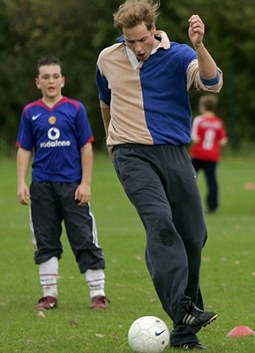
Royal action man Prince William has had to postpone a mountain rescue course - after being crocked by a ten-year-old during football training.
William pulled a tendon in his knee after last week's kickabout with Premiership club Charlton Athletic. Now medics have put him on the sick list. "He has to wear a knee brace if he wants to do anything other than walk, to stop it getting worse," confided one friend. The Prince took part in the session in his new role as president-elect of the FA. He has seen Prince Charles's personal doc and is now having physiotherapy at Cirencester hospital, near his country home Highgrove. "The really important thing is that his leg heals before he starts at Sandhurst in January," said his pal. "He doesn't want to inherit Harry's nickname Sicknote." 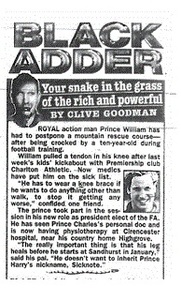
Clarence House staff were suspicious and complained to the police that they believed their telephone conversations had been intercepted. The paper's royal reporter Clive Goodman and a private investigator called Glenn Mulcaire were put on trial at the Old Bailey the following year and were jailed at the beginning of 2007. Andy Coulson promptly resigned as editor.
The case attracted little attention from most papers, the Guardian and Independent giving it the most space, including commentaries and analysis. Stephen Glover wrote in the Independent that he 'couldn't get worked up about it'. In the same issue Bill Hegarty, a former editor of the Sunday People, wrote a jolly piece about how recording equipment had been attached to a restaurant table routinely used by the Sunday Times to entertain important guests. He also described how the Mirror's Donald Zec and a Buckingham Palace boilerman had built a financial arrangement that led to a story about how the Queen's coronation day carriage had been equipped with a dozen hot-water bottles. Over at the Guardian, Ian Cobain wrote that Goodman's crime was at the 'lower end of journalistic skulduggery' and detailed other ruses in common use. Polly Toynbee had been less forgiving when the pair first appeared in court in December: Where was the explosion of outrage at the News of the World case this week? Its royal editor, Clive Goodman, pleaded guilty to bugging aides to Prince Charles and Prince William. And this was only a small part of their operation. Her colleague Roy Greenslade was also uncomfortable, writing this once sentence had been passed:
Goodman, in pleading guilty to the charges, has prevented us from knowing as much about this case as we should. (It's always amazing, is it not, that newspapers which demand transparency from public bodies and institutions like to maintain secrecy about their own activities). So now we must rely on the Press Complaints Commission to investigate just what did happen at the News of the World. I repeat some of the questions I posed a couple of weeks ago. Do we really believe that Goodman was alone in using this method of obtaining stories? Did any NoW executive know what he was up to? Has the editor, Andy Coulson, held an internal investigation? If not, why not? If he did, what were the results? A clean bill of health? If so, why no public statement to that effect? (He may well reply that with a case before the courts, he couldn't speak out. Fine, then let him do so now). 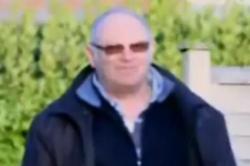 Steve Whittamore Steve Whittamore
Nobody else seemed unduly concerned. Nobody else seemed to care that Mulcaire was being paid a retainer of more than £100,000 a year, or that he had also admitted intercepting the phones of Gordon Taylor, Elle McPherson, Simon Hughes and Max Clifford. David Cameron was so unperturbed that he went on to appoint Andy Coulson his chief press officer.
The Press Complaints Commission wrote to editors to check that they had controls in place to prevent bad practice and swiftly reported that there was no evidence that anyone at the News of the World, other than Goodman, had done anything illegal. It updated its code of practice and declared it time to move on. It turns out that Mulcaire was one of around a dozen - or maybe more - private investigators with close links to Fleet Street, and he was not the first to attract police attention. In 2003 the police and the information commissioner had separately looked into the activities of Steve Whittamore, who traded in finding telephone numbers and addresses of public figures. The police were following up allegations that a police communications worker had been unlawfully accessing the national database and passing on information. Whittamore, the communications worker and two others were charged with conspiring to commit misconduct in a public office. They appeared at Southwark Crown Court in 2004 and were all conditionally discharged. The investigation had uncovered details of thousands of requests from journalists for personal information, all logged in colour-coded notebooks, and Richard Thomas, the commissioner, had started proceedings against Whittamore and five others. But the leniency of the Southwark sentence led him to conclude that to continue with them would not be in the public interest. He tried to persuade the PCC to create a joint investigative regime, but the PCC was resistant, saying its role was to respond to complaints, not to go looking for misdeeds. After three years of fruitless discussions with the PCC, Thomas submitted two reports to Parliament in 2006 in an effort to get tougher penalties for breaches of the Data Protection Act, but said he did not have the resources to follow up all the material his team had found. 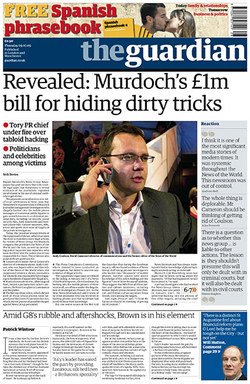
After the Goodman-Mulcaire trial everything went quiet for a while, but behind the scenes Gordon Taylor was negotiating a huge payout from News International and the Guardian's Nick Davies was on the scent. The Guardian has never shown great admiration for Rupert Murdoch - it devoted a great deal of effort and space to denouncing his tax avoidance strategies long before Starbucks, Amazon and Google existed - and this time it ran a big number.
The timing - July 9, 2009 - was interesting. Rebekah Brooks, had just become News International's chief executive. Three weeks earlier Murdoch had given her away at her wedding on an Oxfordshire country estate, a celebration followed a few days later by the News Corp summer party at the Oxo building in London. David Cameron and Gordon Brown were guests at both.Nick Davies reported that News International had paid Taylor £700,000 over the phone hacking admitted by Mulcaire and suggested that hundreds more 'victims' could be in line for payments based on documents arising from the 2007 investigation. This time other papers did pick up on the story, but still without any great enthusiasm. Most appeared to think that the Guardian was reheating cold news and Brooks accused the paper of misleading the public. Andy Hayman, who had overseen the police investigation into the story of William's knee, wrote in The Times that the Met had 'left no stone unturned'. He accepted that hundreds of names may have been on Mulcaire's 'target list', but said there was no evidence that more than a handful of phones had been tampered with. 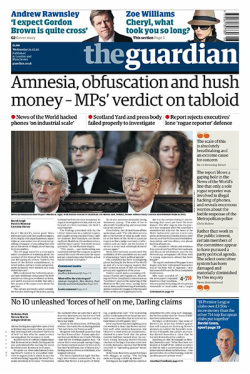
The Commons Media and Culture Select Committee was unconvinced. It challenged NI's assertions that Goodman was a rogue reporter acting without the knowledge of his superiors, it challenged the information commissioner for failing to tell people that they had been on Whittamore's radar in 2003, and it challenged the Met for failing to look beyond the princes in the Goodman case.
In February 2010 the committee accused NI (now busy settling with Max Clifford) of obfuscation and collective amnesia. This excited the Guardian, which splashed on the report, but no other paper gave it more than about 250 words - if they bothered to mention it at all. Then the New York Times joined the party in September with a magazine feature in which the former NoW showbiz reporter Sean Hoare said that he had been actively encouraged to hack into phones. Hoare, who had been sacked by Coulson in 2005, was the first named journalist to stand up to blow the whistle and the British media were eager for his tales of life in Wapping. He obliged with descriptions of how he had been paid to get drunk and take cocaine with rock stars, 'doing things no sane man would do', and of how he was urged to 'practise his dark arts' to get stories. A month later, Channel 4 weighed in with a Despatches programme. The police responded by trying, without success, to gather new evidence from the New York Times and C4, and the CPS told them that the evidence was well below the threshold for any prosecutions. But the Guardian had further ammunition: in December it published details of Sienna Miller's claim against the newspaper, including a complaint that the police had failed to interview journalists who might have been incriminated by evidence gathered in 2005-6. With the heat back on, the News of the World suspended its assistant editor. News International went back over internal documents relating to Goodman and decided to hand them to the police. At the same time, the CPS announced that it would be reviewing the evidence collected for the Goodman case. This put Assistant Deputy Commissioner John Yates under pressure - he had been asked in 2009 to conduct a review of the Goodman inquiry and had concluded after a single meeting that the investigation had gone as far as it could. The hacking inquiry was reopened. The heat was also on Cameron. His judgment in hiring Coulson had already been called into question. By mid-January his press chief felt he had no option but to quit. In April the arrests started. News International agreed to pay Sienna Miller £100,000, apologised to eight hacking victims and set up a compensation fund. But with News Corp trying to buy the half of BSkyB it didn't own - preferably without the hassle of a monopolies investigation - the Guardian's Nick Davies was still not letting up. On July 4-5, all hell broke loose with this story: The Telegraph and the Independent also splashed on it, the Times, FT and
Mail put it on their fronts. There would be no stopping the story now - and it was moving faster than ever. Finally the general public began to take note and there was an internet outpouring of outrage. Advertisers withdrew from the News of the World and on July 7 James Murdoch announced that the paper must close. Rebekah Brooks told staff that there was no alternative because the brand had become 'toxic'. Their jobs would go, but she would stay in position to steer the company through the crisis. She lasted a week. And what a week it was - see the timeline on the right. The fuse lit by the information commissioner in 2003 had moved slowly at first. But the sparks became more intense and the wire burnt more and more quickly - until the flame finally ran into the bomb that was Milly Dowler's phone and exploded. To be continued... |
|
18 pages of news, background, opinion, reaction, videos and press reviews
PLUS links to commentary and reportage from Nick Davies James Doleman George Brock Roy Greenslade Tim Crook Steven Barnett Richard Samford Robin Lustig Des Freedman Dominic Ponsford Anna Raccoon Damian McBride Michael Wolff Gary Gibbon 
The police investigations did get out of hand; they were out of proportion with the suspected crimes; the costs were astronomical...But none of this money would have been spent if Coulson hadn't encouraged a culture of hacking and then lied through his teeth for five years, clinging to the myth that Clive Goodman was "one rogue reporter" - the SubScribe commentary ... three years after a bad week for redtops
Tuesday July 5
Guardian publishes Milly Dowler story Thursday July 7 James Murdoch announces closure of News of the World Friday July 8 Coulson and Goodman arrested Sunday July 10 Last edition of News of the World published. Rupert Murdoch flies into London Monday July 11 News Corp bid to take over BSkyB referred to Monopolies and Mergers Commission Tuesday July 12 Home Affairs committee reopens inquiry into phone hacking Weds July 13 Cameron announces that Lord Justice Leveson will head public inquiry into press standards News Corp pulls out of BskyB bid Tom Crone, NI's legal manager, leaves the company Thursday July 14 Neil Wallis, former deputy editor of News of the World, arrested (he is finally told that no action is to be taken against him after 20 months on police bail) Friday July 15 Brooks resigns Les Hinton, Murdoch's longtime righthand man, resigns as chief executive of Dow Jones Murdoch apologises to the Dowlers Sunday July 17 Brooks arrested Sir Paul Stephenson quits as Met Commissioner Monday July 18 Yates resigns Sean Hoare found dead at home. |
Please sign up for SubScribe updates
(no spam, no more than one every week or two)
|
|
|

